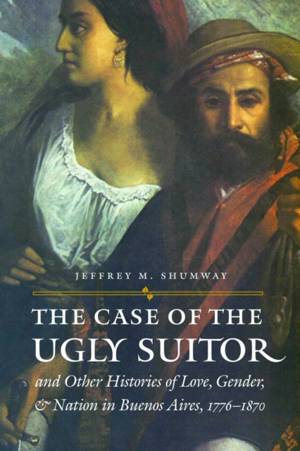
Bedankt voor het vertrouwen het afgelopen jaar! Om jou te bedanken bieden we GRATIS verzending (in België) aan op alles gedurende de hele maand januari.
- Afhalen na 1 uur in een winkel met voorraad
- In januari gratis thuislevering in België
- Ruim aanbod met 7 miljoen producten
Bedankt voor het vertrouwen het afgelopen jaar! Om jou te bedanken bieden we GRATIS verzending (in België) aan op alles gedurende de hele maand januari.
- Afhalen na 1 uur in een winkel met voorraad
- In januari gratis thuislevering in België
- Ruim aanbod met 7 miljoen producten
Zoeken
The Case of the Ugly Suitor and Other Histories of Love, Gender, and Nation in Bueno
Jeffrey M Shumway
€ 45,95
+ 91 punten
Omschrijving
In 1840 Gumerscindo Arroyo hoped to marry Francisca Canicoba, but her father forbade it. Consequently, Francisca took her father to court for permission to marry, where he objected on the grounds that Arroyo was simply too ugly. In the courtrooms of nineteenth-century Buenos Aires, children battled parents in order to fulfill their romantic desires and marry the mate of their choice. Parents and guardians also struggled for custody of young children, which some did out of love while others were greedy for child labor. In courtrooms and elsewhere, women challenged their traditional status as social and intellectual inferiors. Though all these struggles existed in earlier times, the nineteenth century injected a new dynamic into such conflicts: Argentina's revolution against Spain and the subsequent attempts by political and intellectual leaders to craft a new nation out of the vestiges of Spanish colonialism. The family, many leaders recognized, was the vital building block of the nation. Hence, matters of the heart and hearth intertwined with matters of the state. Examining family conflicts and the political and legal backdrop of those cases reveals strong continuities in attitudes about gender and family. At the same time, ideological influences of the revolutionary movement combined with the practical needs of nation building to create new freedoms and new identities for women and children over the course of the nineteenth century. The Case of the Ugly Suitor brings these family and national struggles to life, many times in the words of the participants themselves.
Specificaties
Betrokkenen
- Auteur(s):
- Uitgeverij:
Inhoud
- Aantal bladzijden:
- 220
- Taal:
- Engels
- Reeks:
Eigenschappen
- Productcode (EAN):
- 9780803293267
- Verschijningsdatum:
- 1/07/2005
- Uitvoering:
- Paperback
- Formaat:
- Trade paperback (VS)
- Afmetingen:
- 155 mm x 229 mm
- Gewicht:
- 263 g

Alleen bij Standaard Boekhandel
+ 91 punten op je klantenkaart van Standaard Boekhandel
Beoordelingen
We publiceren alleen reviews die voldoen aan de voorwaarden voor reviews. Bekijk onze voorwaarden voor reviews.









